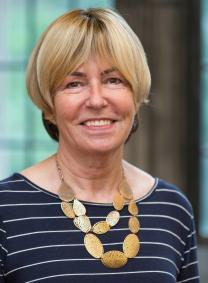Symposium on Healthy Aging to Be Held October 20
The event will include NSHAP researcher speakers and allow attendees an opportunity to take health assessments.
By Sarah Steimer
Through a generous donation from a University of Chicago alumna, a Symposium on Healthy Aging will be held Thursday, October 20, 2022, at the Chicago Theological Seminary. Attendees will hear from experts in the field of aging and also have an opportunity to take the same personal health assessments that NORC researchers use for the National Social Life, Health and Aging Project (NSHAP).
“I thought it would be fun for the people who were at this symposium to see how cutting-edge social sciences are measuring these indicators of aging,” says Linda Waite, professor in the Department of Sociology, NORC Senior Fellow, and NSHAP Principal Investigator. “We're setting up stations where attendees can take the assessments that we give to our survey respondents.”
The donation funding the event comes from Maurine Kornfeld, AB 1942, AM 1948 Crown Family School, who — at age 100 — is enthusiastic about staying socially and physically active as she ages.
Speakers at the symposium include physician scientists who work on NSHAP. “One of the things that I wanted to do was to bring in their clinical and diagnostic expertise,” Waite says. “So we have a diabetologist, we have an otolaryngologist, and we have a pharmacologist, among others.”
The event will include two keynote addresses. The first, from William Dale, a Senior Fellow at NORC and the department chair of Supportive Care Medicine at City of Hope National Medical Center, will explore how we should think about medical care for older adults differently. The second, from Patricia Boyle, a neuropsychologist at Rush University’s Alzheimer's Disease Center, will focus on cognition changes in aging adults.
The morning symposium will include discussions on diabetes, sense of smell, and medications; the afternoon symposium will cover cultural differences such as race, ethnicity, and sexual minorities. There will also be conversations around frailty; group exercise; and social networks, community, and religiosity.
Waite says she hopes attendees will leave the event with an understanding that the experience of aging is unbelievably diverse. She also hopes to highlight some of the factors that play a large role in healthy aging that haven’t been well-explored, such as loneliness and isolation, which she says exacerbate biological and functional issues that people might be facing.
“Think about the social and think about health and well-being holistically,” Waite says. “We want to show cutting-edge research from doctors and doctor-researchers and social and behavioral sciences researchers. Here's how it's different across some of the groups that we've studied.”
Registration now open:
In-Person Attendance
Online Attendance
Schedule of Events
|
Time |
Session Description |
|
9:00 – 10:00 am |
Continental Breakfast & Personal Health Assessments (see below) |
|
10:00 – 10:25 am |
Welcome & Opening Remarks Linda Waite, PhD Cheryl Simmons, PhD |
|
10:25 – 11:25 am |
First Keynote Address William Dale, MD, PhD: What is Health? |
|
11:25 – 11:35 am |
Morning Coffee/Tea Break |
|
11:35 – 12:40 pm |
Morning Symposium Elbert Huang, MD: Diabetes Jay Pinto, MD: Sense of Smell Dima Qato, PharmD, MPH, PhD: Medications |
|
12:40 – 1:25 pm |
Lunch & Personal Health Assessments (see over) |
|
1:25 – 2:25 pm |
Second Keynote Address Patricia Boyle, PhD: Healthy Cognitive Aging |
|
2:25 – 2:40 pm |
Afternoon Coffee/Tea Break |
|
2:40 - 3:40 pm |
Community & Healthy Aging Cheryl Simmons, PhD: Group Exercise Megan Huisingh-Scheetz, MD: Frailty Markus Schafer, PhD: Social Networks, Community, Religiosity |
|
3:40 – 3:55 pm |
Second Afternoon Break (no refreshments) |
|
3:55 – 4:40 pm |
Afternoon Symposium: Cultural Differences Jocelyn Wilder, MPH: Race Lissette Piedra, PhD: Ethnicity Michelle Johns, PhD: Sexual Minorities |
|
4:40 – 4:55 pm |
Closing Remarks Linda Waite, PhD |
|
4:55 – 6:00 pm |
Reception |
Personal Health Assessments (Will Be Described in Further Detail in Program; Exact List of Assessments Offered TBD)
- Smell
- Timed walk
- Touch
- Medication Log
- Chair stands
- Loneliness/Social Isolation
- Support & Demands
- Discrimination experiences
- Hypertension (maybe the three ways we measure: doctor told you, measured and meds)
- Cognition?
 THE UNIVERSITY OF CHICAGO
THE UNIVERSITY OF CHICAGO


